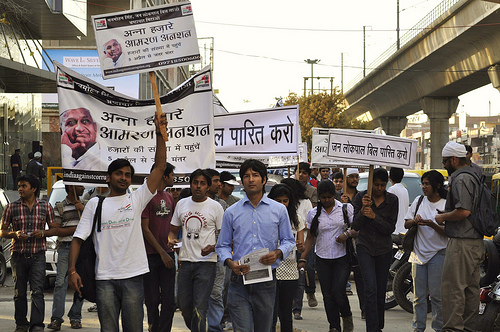Seize Corrupt Indian Assets: Proposed Lokpal Bill

Please note that we are not authorised to provide any investment advice. The content on this page is for information purposes only.
31 May 2011.
The threat of serving a jail sentence doesn’t seem to deter corrupt officials anymore according to activists in New Delhi. After all, he can enjoy the ill-gotten gains after his sentence. Now, a drafting committee agreed to confiscate and liquidate assets obtained through corruption under the proposed Lokpal bill.
31 May 2011.
The threat of serving a jail sentence doesn’t seem to deter corrupt officials anymore according to activists in New Delhi. After all, he can enjoy the ill-gotten gains after his sentence. Now, a drafting committee agreed to confiscate and liquidate assets obtained through corruption under the proposed Lokpal bill.
Sources speaking to the Times of India said that in case of a complaint of corruption, the Lokpal can order an “interdiction”, that is an order preventing the public servant from transferring any asset. At the conclusion of the investigation, if the person is convicted for corruption, the court will have to decide what is the loss caused to the government and allocate that loss to the guilty party. Civil society sources said that the government in principle had agreed to this proposal but modalities needed to be worked out and there were still certain reservations on the timing of this “confiscation” of property.
Government sources said, [quote]”We have agreed that if a public servant has amassed wealth through corrupt means and it is proved so, then the assets will be confiscated.” [/quote] The Lokpal will have powers to give appropriate directions to prevent destruction of records during investigations and prevent the public servant from secreting assets allegedly acquired by him through corrupt means.
HRD minister Kapil Sibal said that there was also an agreement in the meeting that the Lokpal will have power to look into any matter of corruption against public servants.
[quote]”The basic idea is to have an empowered Lokpal, which will have full autonomy, independence from the government and which will have powers to investigate complaints of corruption, prosecute all public servants. This principle is non-negotiable,” he said.[/quote]
Related: The Cost of Corruption in India
Related: Corruption on The Rise in India
Related: Corruption Perceptions Index
India’s fight against corruption is seen as a crucial factor in India’s success as an emerging power and continued growth. The country desperately needs to transform it’s image – and reduce poverty. Anna Hazare draws – and brings to light – a strong link between corruption and poverty.
But in (especially) rural India, the temptation of corruption is greater. And while corruption in business is a universal phenomenon, and India may be no better nor worse at fighting corruption than other countries, India’s business and public sector climate is at serious risk from corrupt practices.
So will seizing India’s corrupt assets deter corruption more than the ratification of the United Nations Convention Against Corruption? Or will Anna Hazare’s rural development programs ultimately erradicate the plaque sweeping over India?
The United Nations Convention Against Corruption serves as a reaffirmation of the government’s commitment to fighting corruption. Strict (and enforced) laws against offenders deter the crime. While social programs that provide officials at lower levels to improve and sustain their communities – without need for corruption, must all work hand in hand to eradicate India’s corruption.
If corruption continues in India, could it affect the countries’ growth and continued success – and in fact cause more poverty? Have your say below.
Liz Zuliani
EconomyWatch.com




